The War on Terror

A new tape surfaced on January 19, 2006, with Osama bin Laden again addressing the U.S. citizens and government. How worried are you about terrorism? According to an Oprah.com poll, more than 60 percent of respondents believe there will be another terrorist attack on U.S. soil, but most of those people do not believe an attack will occur within the next year. Where do you stand?
Terrorist attacks in America. Nuclear weapons abroad. What and who should we worry about? The Oprah Show brings you a special report.
Terrorist attacks in America. Nuclear weapons abroad. What and who should we worry about? The Oprah Show brings you a special report.
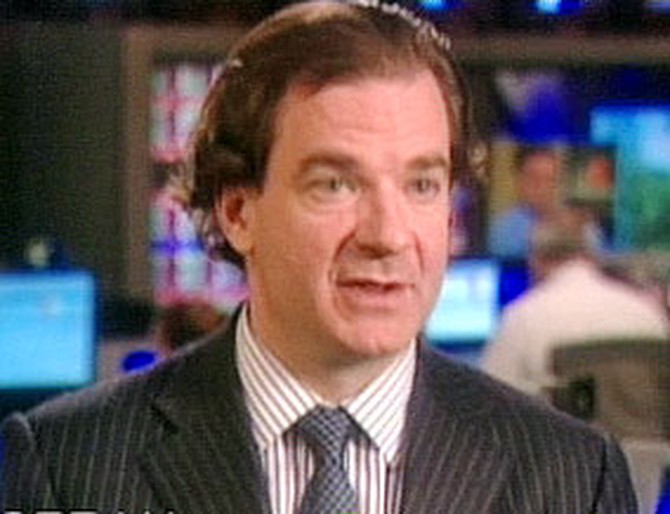
CNN terrorism expert Peter Bergen has spent his career tracking terrorists. He has stood face to face with some of the deadliest murderers on the planet, risking his life traveling to countries like Pakistan, Afghanistan and Yemen. His newest book is The Osama bin Laden I Know.
Peter says the newest bin Laden tape illustrates several highly important points. The first of which, he says, is "that he's alive and well. He wants to be in the game."
"More ominously is his offer of a truce," Peter says. "Islamic law has a tradition of warning before an attack."
Peter says the newest bin Laden tape illustrates several highly important points. The first of which, he says, is "that he's alive and well. He wants to be in the game."
"More ominously is his offer of a truce," Peter says. "Islamic law has a tradition of warning before an attack."
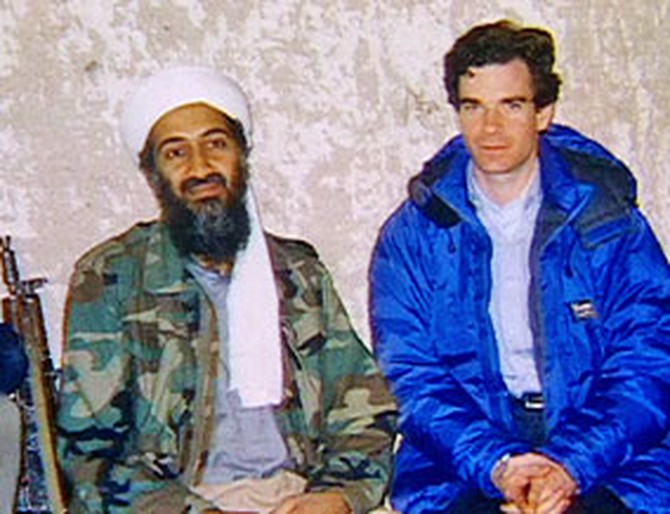
In 1997, after being blindfolded and driven five hours to a secret location in Afghanistan, Peter found himself in a hut with Osama bin Laden. "He struck me as an intelligent guy, very well informed," Peter says. "He was very serious. The people around him treated him like a god."
Something bin Laden told Peter during that interview would eventually change the world. "He said, 'We're going to declare war on the United States,'" Peter says. "At the back of my mind, I said, 'We're sitting in a mud hut in the middle of the night in Afghanistan. How are you going to attack the United States?' But of course, within four years we had an idea."
Something bin Laden told Peter during that interview would eventually change the world. "He said, 'We're going to declare war on the United States,'" Peter says. "At the back of my mind, I said, 'We're sitting in a mud hut in the middle of the night in Afghanistan. How are you going to attack the United States?' But of course, within four years we had an idea."
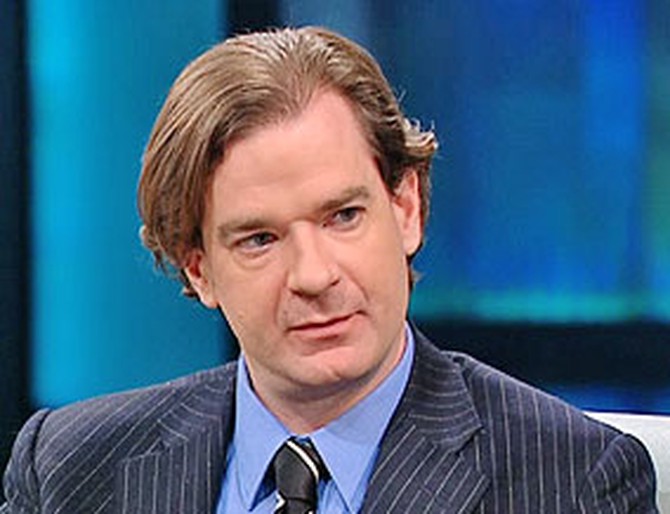
Despite the lack of a recent major attack within our borders, Peter says we cannot easily ignore the intense threat of another terrorist attack. "This is a guy who doesn't take vacations or weekends," he says. "He's a full-time terrorist and he wants to destroy the United States. If he could, he would."
Peter believes we "absolutely" will be attacked again. "What form of attack it will be, when it will be, I can't tell you. But al-Qaida isn't going to decide one day, 'Oh, the United States is so great.'"
Peter says one of the biggest dangers is that, to some degree, Americans have lost sight of the lessons of 9/11 and have lost vigilance against those who wish the country harm. "Americans have many virtues, but patience is not usually one of them," Peter says. "Our enemies are incredibly patient; for them this is a generational warfare. For us, we think about this year, maybe the next election cycle. These guys are thinking in terms of a hundred years of battle against us."
Peter believes we "absolutely" will be attacked again. "What form of attack it will be, when it will be, I can't tell you. But al-Qaida isn't going to decide one day, 'Oh, the United States is so great.'"
Peter says one of the biggest dangers is that, to some degree, Americans have lost sight of the lessons of 9/11 and have lost vigilance against those who wish the country harm. "Americans have many virtues, but patience is not usually one of them," Peter says. "Our enemies are incredibly patient; for them this is a generational warfare. For us, we think about this year, maybe the next election cycle. These guys are thinking in terms of a hundred years of battle against us."
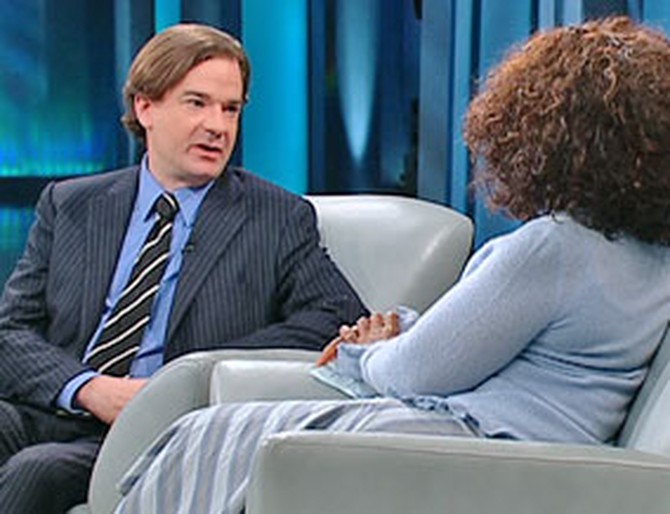
According to Peter, the fact that al-Qaida remains determined to inflict damage upon the United States does not necessarily mean that we will see a repeat of a 9/11-style attack. Instead, he says future attacks are likely to be smaller in scale. "In London, they killed 56 people. In Madrid, they killed 191 people. The group remains pretty virulent, and suddenly there's an ideological movement the group has sort of spawned that can attack us," Peter says.
Though we are more aware of the existence of terrorist threats, there are significant vulnerabilities in our national defense.
One uncovered plot in Modesto, California, illustrates the danger. "There's a group of guys who got radicalized in prison," Peter says. "Some alleged that they were planning to attack U.S. military bases. They had weapons, they had a plan, they were going to attack synagogues. This seems to me like a pretty serious domestic terrorist cell."
Peter's experience in covering terrorism has led him to past predictions. "I was extremely concerned in the summer of 2001 that an attack was going to happen," Peter says. "So much information was flooding in about their desire to attack us around the world." Because of that, he says, "I knew that it was bin Laden as soon as the second plane hit."
Though we are more aware of the existence of terrorist threats, there are significant vulnerabilities in our national defense.
One uncovered plot in Modesto, California, illustrates the danger. "There's a group of guys who got radicalized in prison," Peter says. "Some alleged that they were planning to attack U.S. military bases. They had weapons, they had a plan, they were going to attack synagogues. This seems to me like a pretty serious domestic terrorist cell."
Peter's experience in covering terrorism has led him to past predictions. "I was extremely concerned in the summer of 2001 that an attack was going to happen," Peter says. "So much information was flooding in about their desire to attack us around the world." Because of that, he says, "I knew that it was bin Laden as soon as the second plane hit."
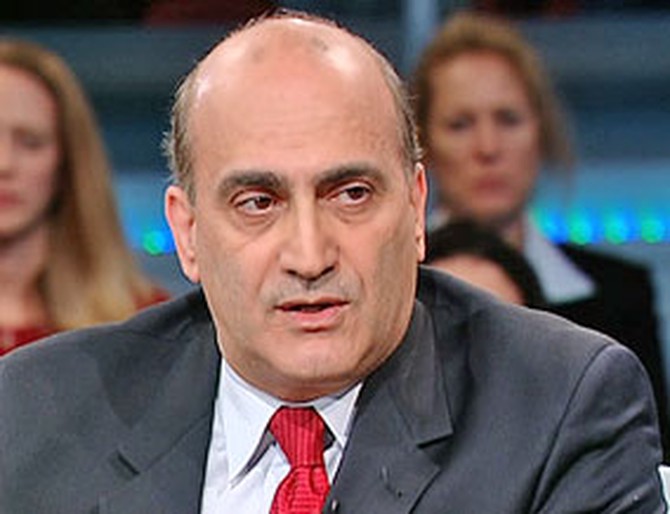
Dr. Walid Phares is a professor of Middle East studies, an expert on terrorism and the author of Future Jihad. He believes we have entered a "second wave" of terrorism in which we face the threat of suicide bombers who are either native-born Americans or recent immigrants. Dr. Phares says the new message from bin Laden "is to the operatives and jihadists inside the United States. It means, 'Strike when you are ready.'"
Dr. Phares estimates there are at least 200 potential suicide bombers inside the United States right now. To justify this number, he cites evidence that the 19 terrorists in the 9/11 attacks claimed to have had support in this country. "Plus, within four years, how many minds have been recruited by al-Qaida because we are making arrests?" Dr. Phares asks. "We are dismantling cells, but the factories that produce those minds—meaning this indoctrination—[are] both within the United States and also overseas."
Like Peter, Dr. Phares says we do not need to expend our energy worrying about another large-scale attack. What Dr. Phares anticipates in the next terror attack is something like a dirty bomb—an explosion that releases radioactive waste material—or a sniper in a place like a school where we don't tend to have concerns about terrorism. "Imagine if one day, years from now, all of that combined would be done at the same time, on the same day, to break down national security and national economy of the United States. This is a day we have to be prepared for."
As an educator, Dr. Phares says he has witnessed a marked increase in Americans' awareness of the Middle East. Education, he says, is the key to combating terrorism. "It's extremely important in fighting terrorism," he says. "Probably more than the government."
Dr. Phares estimates there are at least 200 potential suicide bombers inside the United States right now. To justify this number, he cites evidence that the 19 terrorists in the 9/11 attacks claimed to have had support in this country. "Plus, within four years, how many minds have been recruited by al-Qaida because we are making arrests?" Dr. Phares asks. "We are dismantling cells, but the factories that produce those minds—meaning this indoctrination—[are] both within the United States and also overseas."
Like Peter, Dr. Phares says we do not need to expend our energy worrying about another large-scale attack. What Dr. Phares anticipates in the next terror attack is something like a dirty bomb—an explosion that releases radioactive waste material—or a sniper in a place like a school where we don't tend to have concerns about terrorism. "Imagine if one day, years from now, all of that combined would be done at the same time, on the same day, to break down national security and national economy of the United States. This is a day we have to be prepared for."
As an educator, Dr. Phares says he has witnessed a marked increase in Americans' awareness of the Middle East. Education, he says, is the key to combating terrorism. "It's extremely important in fighting terrorism," he says. "Probably more than the government."
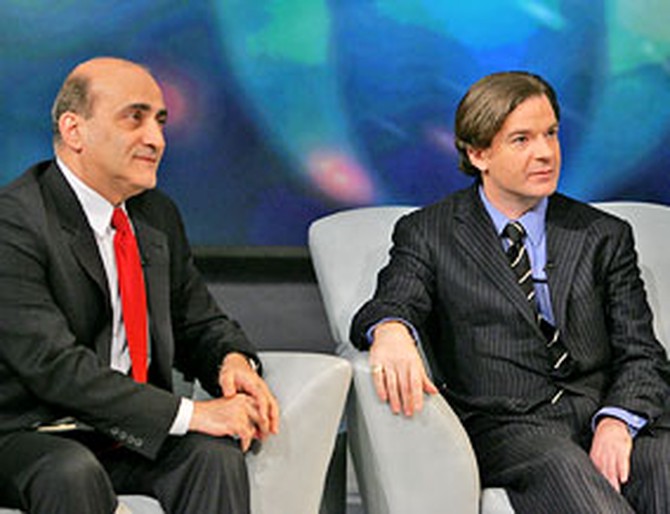
Peter disagrees with Dr. Phares about the danger posed by a "sleeper cell" of native-born Americans or recent immigrant terrorists. Instead, he points to the dangers lurking in Europe.
"I'm concerned about people getting radicalized in Europe and coming over here," he says. "We had an amazing case of a female suicide bomber in Iraq in November. She was Belgian. She and her husband went to conduct a suicide operation in Iraq, but they could have just as easily come here to try and conduct some kind of operation here. They were traveling on European passports, and they didn't have criminal records. I think in the future you can imagine an attack conducted in the United States by somebody who is a woman."
"I'm concerned about people getting radicalized in Europe and coming over here," he says. "We had an amazing case of a female suicide bomber in Iraq in November. She was Belgian. She and her husband went to conduct a suicide operation in Iraq, but they could have just as easily come here to try and conduct some kind of operation here. They were traveling on European passports, and they didn't have criminal records. I think in the future you can imagine an attack conducted in the United States by somebody who is a woman."
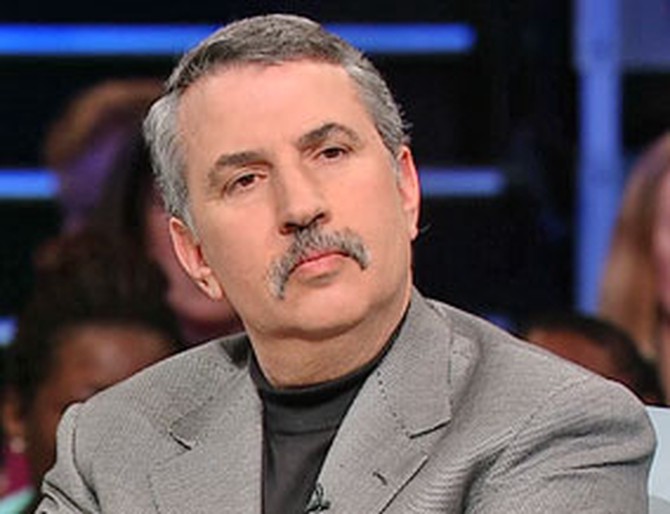
Thomas Friedman, a three-time Pulitzer Prize-winning columnist for The New York Times, has covered the Middle East for more than 20 years and is the author of the best-seller The World Is Flat.
Thomas sees the bin Laden tape in a potentially positive light. "I think that it will be interpreted on the Arab street as a sign of weakness," he says. "Because after all he said, 'I'm ready to accept a cease-fire.' This is not the bin Laden they have come to know and, in some cases, respect. When you think you're winning, embracing cease-fire is not the first thing on your mind."
But Thomas warns that taking bin Laden at his word is not a good idea. "What bin Laden is after, ultimately, is an American withdrawal before completing any kind of democratization process in Iraq or Afghanistan. He sees the way to do that as encouraging those voices in the United States who want to get out. He's hoping to stoke up some debate here, for people to say, 'Look we can leave, he wants a cease-fire.'"
Thomas sees the bin Laden tape in a potentially positive light. "I think that it will be interpreted on the Arab street as a sign of weakness," he says. "Because after all he said, 'I'm ready to accept a cease-fire.' This is not the bin Laden they have come to know and, in some cases, respect. When you think you're winning, embracing cease-fire is not the first thing on your mind."
But Thomas warns that taking bin Laden at his word is not a good idea. "What bin Laden is after, ultimately, is an American withdrawal before completing any kind of democratization process in Iraq or Afghanistan. He sees the way to do that as encouraging those voices in the United States who want to get out. He's hoping to stoke up some debate here, for people to say, 'Look we can leave, he wants a cease-fire.'"
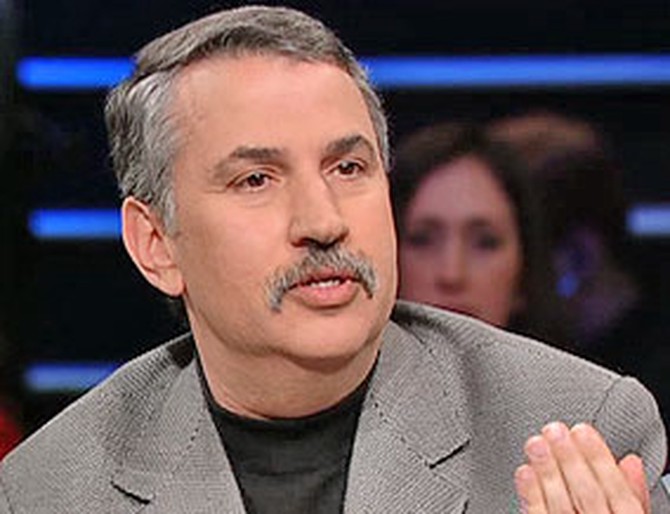
In response to the dangers posed by al-Qaida, Thomas has tried to remain fearless. Instead, he's been "going golfing. My motto is leave the cave-dwelling to bin Laden," he says.
Thomas says terrorists have effectively turned the best parts of our society—openness and trust—into what appears to be a sense of vulnerability. "What these people are doing is they're taking instruments from our daily life—the backpack, the car, the shoe, the cell phone—and they're turning them into weapons," he says. "In doing that, they're forcing us to take trust out of our open society. That's why it is so dangerous."
Thomas says terrorists have effectively turned the best parts of our society—openness and trust—into what appears to be a sense of vulnerability. "What these people are doing is they're taking instruments from our daily life—the backpack, the car, the shoe, the cell phone—and they're turning them into weapons," he says. "In doing that, they're forcing us to take trust out of our open society. That's why it is so dangerous."
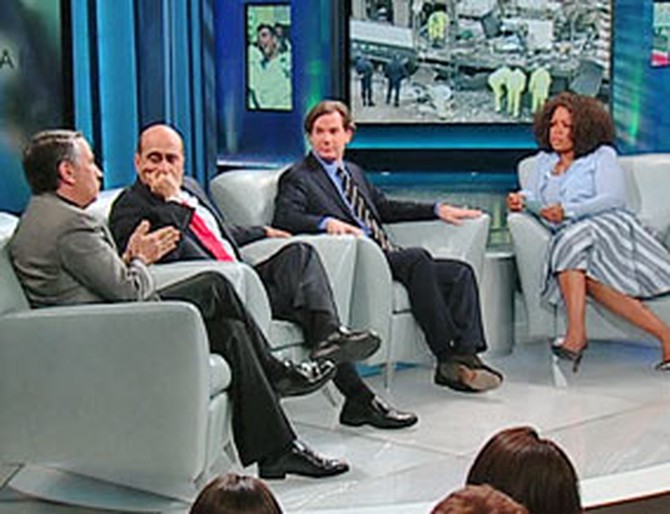
Thomas believes al-Qaida is trying everything they can to defeat the United States in Iraq. "After all, they don't want to rule Nevada," he says. "They want to rule Saudi Arabia and Syria and Lebanon, and they know the resonance they will get if they can defeat America in the heart of their world would be enormous."
Even if we begin to defeat al-Qaida in Iraq, however, Thomas thinks we still face the possibility of an attack. "I think the most dangerous and vulnerable time for us is if we actually start to defeat them in collaboration with other Arabs and Muslims," he says. "I'm not saying defeat, but I think that what it will do is prompt them to want to throw the Hail Mary pass—the "Hail Muhammad" pass—where they try to do something so spectacular that it will disguise what will be a fundamental and strategic defeat in their world. That's what I think is the most dangerous moment for us."
Dr. Phares says the case of "shoe bomber" Richard Reid, who was apprehended by fellow passengers on a flight while trying to light a bomb hidden in his shoe, is an example of how educated people are the best defense we have against terrorism. "Imagine the shoe bomber before 9/11," he says. "He would be fixing his shoe, and if you looked at him, you would be sued. After 9/11, he's trying to do something. Not the FBI, not the agencies, but the passengers were on top of him."
In addition to education and trust, Dr. Phares has another motto on how to fight terrorism: "Live in courage," he says. "If they know we are in fear, [the power of al-Qaida and others] will increase."
Even if we begin to defeat al-Qaida in Iraq, however, Thomas thinks we still face the possibility of an attack. "I think the most dangerous and vulnerable time for us is if we actually start to defeat them in collaboration with other Arabs and Muslims," he says. "I'm not saying defeat, but I think that what it will do is prompt them to want to throw the Hail Mary pass—the "Hail Muhammad" pass—where they try to do something so spectacular that it will disguise what will be a fundamental and strategic defeat in their world. That's what I think is the most dangerous moment for us."
Dr. Phares says the case of "shoe bomber" Richard Reid, who was apprehended by fellow passengers on a flight while trying to light a bomb hidden in his shoe, is an example of how educated people are the best defense we have against terrorism. "Imagine the shoe bomber before 9/11," he says. "He would be fixing his shoe, and if you looked at him, you would be sued. After 9/11, he's trying to do something. Not the FBI, not the agencies, but the passengers were on top of him."
In addition to education and trust, Dr. Phares has another motto on how to fight terrorism: "Live in courage," he says. "If they know we are in fear, [the power of al-Qaida and others] will increase."
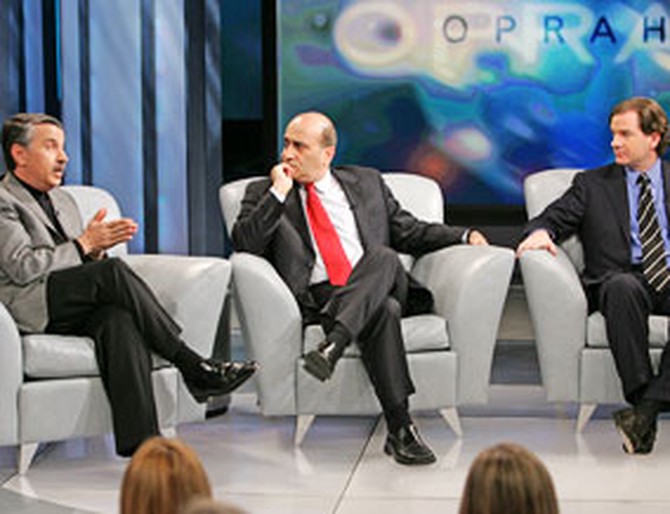
Peter says the emerging situation in Iran is particularly frightening because the country seems highly determined to obtain nuclear weapons and is not likely interested in diplomatic discussion.
"I mean, the president [of Iran, Mahmoud Ahmadinejad] is somebody who, by his own account, wants to abolish the state of Israel," Peter says. "He's not somebody you can negotiate with, I don't think."
Dr. Phares says Iran's nuclear ambitions should come as no surprise; they have been vocal about developing this capability since the '80s and have been subjected to monitoring because of them. He says Iran's push to develop a nuclear program was likely hastened by a fear of "demonstrations by [Iranian] students for the last five years, a fear of their own people in public and a fear of what they see in the neighborhood: Afghanistan's elections, Iraq's elections, Beirut demonstrations."
With a nuclear weapon, Dr. Phares believes Iran becomes invincible in the Middle East. "And then nothing could help the Iranian people against their regime."
"I mean, the president [of Iran, Mahmoud Ahmadinejad] is somebody who, by his own account, wants to abolish the state of Israel," Peter says. "He's not somebody you can negotiate with, I don't think."
Dr. Phares says Iran's nuclear ambitions should come as no surprise; they have been vocal about developing this capability since the '80s and have been subjected to monitoring because of them. He says Iran's push to develop a nuclear program was likely hastened by a fear of "demonstrations by [Iranian] students for the last five years, a fear of their own people in public and a fear of what they see in the neighborhood: Afghanistan's elections, Iraq's elections, Beirut demonstrations."
With a nuclear weapon, Dr. Phares believes Iran becomes invincible in the Middle East. "And then nothing could help the Iranian people against their regime."
Published 01/23/2006

